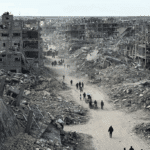Bujumbura, 28 October 2014 – “Preventive detention must remain last resort”: this is the message of the broad campaign launched by Avocats Sans Frontières (ASF), together with the Ministry of Justice in Burundi. Citizens, lawyers, judges, prison staff…this action concerns everyone involved in the penal chain, in order to ensure that an infraction does not automatically mean that the individual concerned is arrested and held in custody.
Preventive detention consists of depriving someone of their freedom, even before they have had the opportunity to appear in court. By taking the decision to imprison someone who is still presumed innocent, the judicial authorities perform an act that may have grave consequences. “This goes beyond simply prohibiting the freedom to come and go as one pleases,” says Sistor Havyarimana, Coordinator of the Access to Justice programme at ASF. “The entire family and professional lives of the accused, their social relationships, and their physical and mental health are also at stake.” According to recent estimates, around 3,750 people are in preventive detention in Burundi, which is nearly half of all prisoners. This situation has provoked ASF, in partnership with the Ministry of Justice, to rally the different actors in the penal chain around one principle: detention must remain a last resort.
“It is hard to reconcile preventive detention with the presumption of innocence,” explains Léonard Gacuko, a university professor in Burundi and co-author of a study commissioned by ASF on the subject*. “For preventive detention to be compatible, it must be time-limited, because each day spent in detention makes the suspect look that bit less innocent, and detention that bit less preventive.”
Over the course of two months, from 8 October to 5 December, various activities are being organised around this issue involving lawyers, judges, prison governors, general prosecutors and civil society. The reason for this, as Anne-Sophie Oger, Representative of the Belgian Technical Cooperation team in Burundi, maintains, is that “the stakeholders in the penal chain must stand united. One missing link in the chain calls it all into question; it affects the person being held in detention and the principle of freedom.”
“Our quest is certainly a sensitive one, but reconciling effective and responsible administration of justice with human rights represents the ideal that the judicial system must strive towards,” adds Jean Bosco Bucumi, Coordinator for institutional and organisational aid at the Ministry of Justice in Burundi.
As well as a conference, debates and television and radio series are also planned, in order to inform the population and raise awareness. Those in preventive detention in six provinces of the country will receive systematic judicial assistance before the courts. An essay-writing competition has also been organised for students from the different law faculties of the universities in Burundi. The next event will be on 30 October, when a moot court competition for lawyers will take place.
ASF’s activities in Burundi concerning preventive detention are financed by the Belgian Ministry for Foreign Affairs, Foreign Trade and Development Cooperation.
The photos of the campaign are updated on a daily basis on ASF’s Facebook page.
*Publication planned for December 2014

Cover picture: the Gitega prison © ASF/Tim Op de Beeck.



